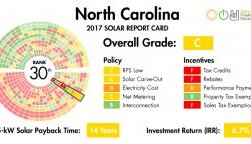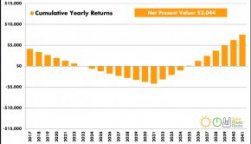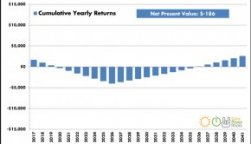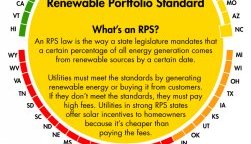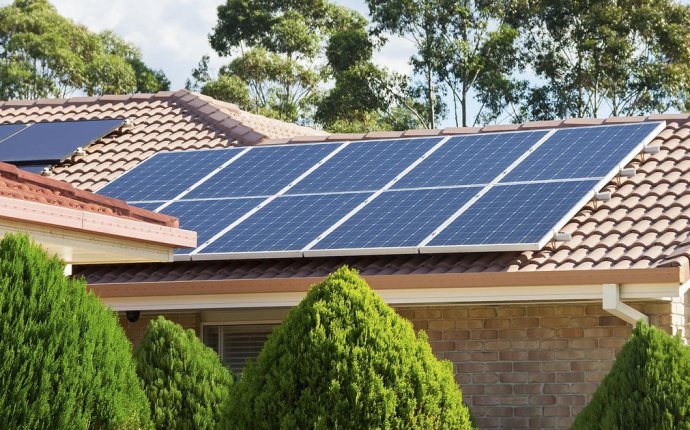
Get solar Power for your Home
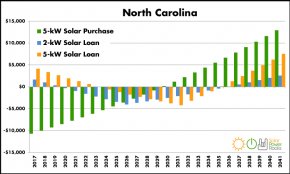
Your guide to going solar in North Carolina
We've designed this page to be a complete guide to the complicated and sometimes confusing process of installing solar panels on a home in North Carolina. Since there's a lot of important information to consider, we've separated the page into sections to help you find what you are looking for. If you find this page useful, please share it with someone who might also find it interesting!
The is all about the various financial options you have in North Carolina. We've created a tool that asks you a few questions about what you hope to get out of a solar purchase and recommends whether you should pursue a solar lease, loan, or outright purchase. Then, we give you a detailed picture of how each could work for you.
The contains all of our latest research on the rules set by the state legislature and public utilities commission that determines how easy it is to go solar in North Carolina. These policies and rules govern everything from renewable energy mandates to whether you get paid retail or wholesale rates for the extra energy your system produces, and can have a huge effect on the viability of solar.
Finally, the lists all of the available financial benefits available to homeowners who go solar. This section includes information about money-back rebates and grants, tax credits, and tax exemptions. If you're looking for what North Carolina is doing to make solar more affordable for its citizens, you'll find it here.
Click any of the boxes below to go to that section of the page, or scroll down to read the page in order.
Your Solar Strategy in North Carolina
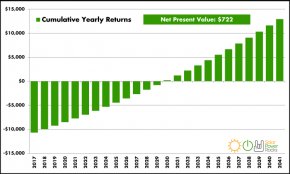 Figuring out the best way to go solar in North Carolina can be a little daunting. From loans and leases to power-purchase agreements, there are a lot of options out there. To help you pick the one that might be best, we've created the handy decision tool below.
Figuring out the best way to go solar in North Carolina can be a little daunting. From loans and leases to power-purchase agreements, there are a lot of options out there. To help you pick the one that might be best, we've created the handy decision tool below.
We'll ask you a few simple questions about you and your home. Once you're done, we'll recommend a good option. Further down this page, we provide cost estimates and example return-on-investment calculations for all the various options:
Compare the Return of Different Solar Investments in North Carolina
The chart above shows the 25-year returns for an investment in solar whether you choose to purchase a system with cash or pay over time with a loan. That might look a little complicated to you, so let's break it down:
The green bars show the return if you pay up front. As you can see, there's a big payment (negative) in year 1, which gets slowly erased by elecricity savings over time. The orange bars, on the other hand, show what happens if you take a solar loan or Home-Equity Line of Credit (HELOC) to pay for the system. You don't put any money down, and you still get the tax credit, meaning you actually come out ahead in year 1. The bars dip after year 6, because your loan payments (over a 15-year term) will exceed your energy savings by a little each year. Still, in the end, you'll come out thousands of dollars ahead over the 25-year estimate.
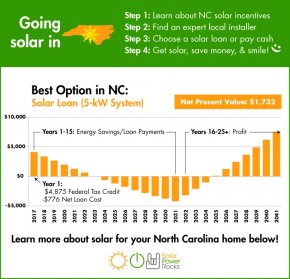 Finally, the blue bars represent a similar loan scenario, but for a smaller solar system. The loan and savings will be smaller, but it's a great way to go solar, even of you don't have a lot of cash or equity. Usually this is where we'd show you the savings with a solar Power-Purchase Agreement, but North Carolina is one of only 5 states in the country that ban third-party ownership.
Finally, the blue bars represent a similar loan scenario, but for a smaller solar system. The loan and savings will be smaller, but it's a great way to go solar, even of you don't have a lot of cash or equity. Usually this is where we'd show you the savings with a solar Power-Purchase Agreement, but North Carolina is one of only 5 states in the country that ban third-party ownership.
There's still a lot to love about solar in the Tar Heel State. Read on to find out more about each option!
Net Present Value of Solar in North Carolina
“Net Present What?!” Don’t panic, this isn’t an economics test. NPV is just a tool used to compare investments. Basically, it asks, “if you had X dollars to invest, which investment would get you the best return?” It relies on the idea that getting a return on your investment sooner is better than later, because you can reinvest your early profits and keep the gain train going.
We compare an investment in solar to a “what-if” investment in a Standard & Poor’s (S&P) 500 stock index fund, which has seen growth of about 7% per year over the past 25 years. We use the cost of solar in North Carolina and ask “how much better or worse (in 2017 dollars) is an investment in solar than stocks?” Here's what we found for the most popular ways of going solar in North Carolina:
Buying Solar in North Carolina
Paying up front used to be the only way to get panels on your roof, and it's still the option that allows you the most control. But it isn't the best option from a percentage return on investment standpoint—that award goes to the .
